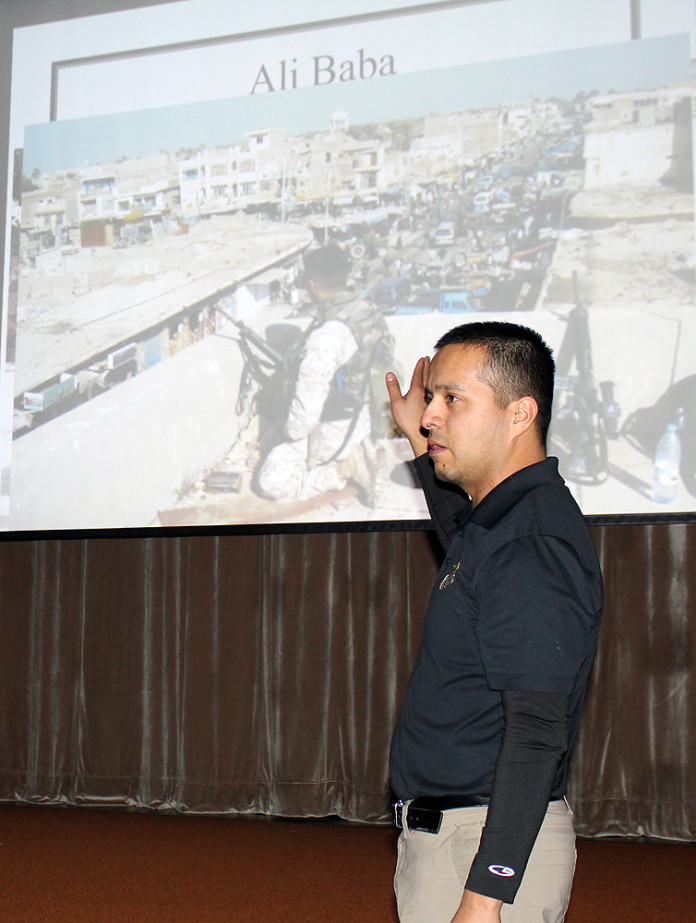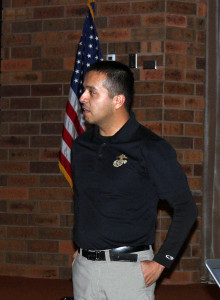
Perry High School teacher Eddie Diaz led a multi-themed discussion entitled, “The United States at War: The Latino Experience 1942-2005,” at the McCreary Community Building auditorium Tuesday.
Presented by the Perry Public Library through a grant from the American Library Association, the event fluctuated between Diaz’s personal experience as a seven-year member of the U.S. Marine Corps and a brief overview of the long and proud history of Latino service in the American military.

Diaz served during Operation Iraqi Freedom in 2004 as a member of the 2nd Battalion, 24th Marines. He was a member of the first Marine reserve battalion to operate independently of a forward operating base and spent much of his deployment in the so-called “Triangle of Death” south and west of Baghdad.
After leaving the Marines, Diaz received a degree in political science from Iowa State University and a graduate degree in education from Drake University. He taught in Des Moines before coming to Perry.
A former member of the Perry City Council, he has also served on the St. Patrick’s Catholic School Board of Education as well as volunteering for numerous other public concerns.
His presentation Tuesday included photos and videos from his time in Iraq as well as a discussion of many of the facets of his duty there.
Diaz explained that, as Latinos and native Iraqis share a similar complexion, it was not unusual for the natives to mistake Latino Marines as Arab, a situation he personally experienced.
“There was one household we would visit and the women there would bring us food,” he recalled. “The oldest lady there would speak Arabic to me and pinch me on the cheek but, of course, I could not answer her. She didn’t like the other Marines, but she liked me, and it meant I got extra falafel (a traditional deep-fried food made of ground chickpeas or fava beans), so I did not mind.”
Diaz also spoke of his closest brush with death, which occurred when his squad came across a car in an intersection in which a woman lay bleeding in the passenger seat. As it turned out, a bomb was in the trunk, and it exploded shortly after another Marine and a Navy doctor had removed the woman who later died.
“It was like God was telling me not to go up there (toward the car) and made my feet heavy,” he said, referring to his unit’s nervous approach to the scene. “I guess I just wasn’t supposed to go up there. If the bomb had gone off a little earlier, I would not be here.”
Diaz said he often encountered Latinos in the service during his seven-year career and noted Latinos are the fastest-growing group serving in the U.S. military.
“There are many reasons for that, but one of them is certainly an economic one,” he said. “As a group, many Latinos are not well-off financially, and the military is one avenue they can take and, of course, the military can help pay for school, as it did for me.”
In addition to economic reasons, Diaz also noted Hispanic cultural features that make a military career appealing.
“You also have to understand that many Latinos come from a traditionally patriarchal culture, one which, I guess you can say, focuses on a bit of machismo,” Diaz said. “You have that factor, plus a very real desire to be fully accepted as an American, and that is a powerful combination. I know that, for me, personally, I have experienced being shown more respect once someone learns I was in the military. Many Latinos see that as a way to gain that acceptance they want, and serving does help. You can argue on whether it should take something like that to feel or be seen as fully American, but it is what it is.”
Noting that Latinos have proudly served in all American wars, Diaz explained that it was not until World War II and after that full acceptance began to be achieved. He also noted that 44 Latinos had received the Congressional Medal of Honor, the highest rate for any ethnic group.
Not to be overlooked, he stressed, was a simple sense of patriotism.
“Many Latinos will tell you, ‘This is my country, too,’ and are happy to volunteer,” Diaz noted. “Diversity is our greatest strength, and the proud history Latinos have in defending our country is proof of that.”

















Thank God for men like Eddie Diaz who served HIS country well. A wonderful story in which I hope many read and learn from. Proud to have you in Perry Mr. Diaz!